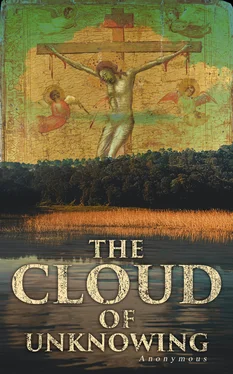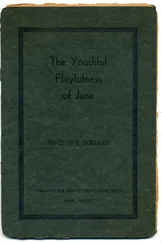What, then, were his special characteristics? Whence came the fresh colour which he gave to the old Platonic theory of mystical experience? First, I think, from the combination of high spiritual gifts with a vivid sense of humour, keen powers of observation, a robust common‑sense: a balance of qualities not indeed rare amongst the mystics, but here presented to us in an extreme form. In his eager gazing on divinity this contemplative never loses touch with humanity, never forgets the sovereign purpose of his writings; which is not a declaration of the spiritual favours he has received, but a helping of his fellow‑men to share them. Next, he has a great simplicity of outlook, which enables him to present the result of his highest experiences and intuitions in the most direct and homely language. So actual, and so much a part of his normal existence, are his apprehensions of spiritual reality, that he can give them to us in the plain words of daily life: and thus he is one of the most realistic of mystical writers. He abounds in vivid little phrases—“Call sin a lump”: “Short prayer pierceth heaven”: “Nowhere bodily, is everywhere ghostly”: “Who that will not go the strait way to heaven, . . . shall go the soft way to hell.” His range of experience is a wide one. He does not disdain to take a hint from the wizards and necromancers on the right way to treat the devil; he draws his illustrations of divine mercy from the homeliest incidents of friendship and parental love. A skilled theologian, quoting St. Augustine and Thomas Aquinas, and using with ease the language of scholasticism, he is able, on the other hand, to express the deepest speculations of mystical philosophy without resorting to academic terminology: as for instance where he describes the spiritual heaven as a “state” rather than a “place”:
“For heaven ghostly is as nigh down as up, and up as down: behind as before, before as behind, on one side as other. Insomuch, that whoso had a true desire for to be at heaven, then that same time he were in heaven ghostly. For the high and the next way thither is run by desires, and not by paces of feet.”
His writings, though they touch on many subjects, are chiefly concerned with the art of contemplative prayer; that “blind intent stretching to God” which, if it be wholly set on Him, cannot fail to reach its goal. A peculiar talent for the description and discrimination of spiritual states has enabled him to discern and set before us, with astonishing precision and vividness, not only the strange sensations, the confusion and bewilderment of the beginner in the early stages of contemplation—the struggle with distracting thoughts, the silence, the dark—and the unfortunate state of those theoretical mystics who, “swollen with pride and with curiosity of much clergy and letterly cunning as in clerks,” miss that treasure which is “never got by study but all only by grace”; but also the happiness of those whose “sharp dart of longing love” has not “failed of the prick, the which is God.”
A great simplicity characterises his doctrine of the soul’s attainment of the Absolute. For him there is but one central necessity: the perfect and passionate setting of the will upon the Divine, so that it is “thy love and thy meaning, the choice and point of thine heart.” Not by deliberate ascetic practices, not by refusal of the world, not by intellectual striving, but by actively loving and choosing, by that which a modern psychologist has called “the synthesis of love and will” does the spirit of man achieve its goal. “For silence is not God,” he says in the Epistle of Discretion, “nor speaking is not God; fasting is not God, nor eating is not God; loneliness is not God, nor company is not God; nor yet any of all the other two such contraries. He is hid between them, and may not be found by any work of thy soul, but all only by love of thine heart. He may not be known by reason, He may not be gotten by thought, nor concluded by understanding; but He may be loved and chosen with the true lovely will of thine heart. . . . Such a blind shot with the sharp dart of longing love may never fail of the prick, the which is God.”
To him who has so loved and chosen, and “in a true will and by an whole intent does purpose him to be a perfect follower of Christ, not only in active living, but in the sovereignest point of contemplative living, the which is possible by grace for to be come to in this present life,” these writings are addressed. In the prologue of the Cloud of Unknowing we find the warning, so often prefixed to mediaeval mystical works, that it shall on no account be lent, given, or read to other men: who could not understand, and might misunderstand in a dangerous sense, its peculiar message. Nor was this warning a mere expression of literary vanity. If we may judge by the examples of possible misunderstanding against which he is careful to guard himself, the almost tiresome reminders that all his remarks are “ghostly, not bodily meant,” the standard of intelligence which the author expected from his readers was not a high one. He even fears that some “young presumptuous ghostly disciples” may understand the injunction to “lift up the heart” in a merely physical manner; and either “stare in the stars as if they would be above the moon,” or “travail their fleshly hearts outrageously in their breasts” in the effort to make literal “ascensions” to God. Eccentricities of this kind he finds not only foolish but dangerous; they outrage nature, destroy sanity and health, and “hurt full sore the silly soul, and make it fester in fantasy feigned of fiends.” He observes with a touch of arrogance that his book is not intended for these undisciplined seekers after the abnormal and the marvellous, nor yet for “fleshly janglers, flatterers and blamers, . . . nor none of these curious, lettered, nor unlearned men.” It is to those who feel themselves called to the true prayer of contemplation, to the search for God, whether in the cloister or the world—whose “little secret love” is at once the energizing cause of all action, and the hidden sweet savour of life—that he addresses himself. These he instructs in that simple yet difficult art of recollection, the necessary preliminary of any true communion with the spiritual order, in which all sensual images, all memories and thoughts, are as he says, “trodden down under the cloud of forgetting” until “nothing lives in the working mind but a naked intent stretching to God.” This “intent stretching”—this loving and vigorous determination of the will—he regards as the central fact of the mystical life; the very heart of effective prayer. Only by its exercise can the spirit, freed from the distractions of memory and sense, focus itself upon Reality and ascend with “a privy love pressed” to that “Cloud of Unknowing”—the Divine Ignorance of the Neoplatonists—wherein is “knit up the ghostly knot of burning love betwixt thee and thy God, in ghostly onehead and according of will.”
There is in this doctrine something which should be peculiarly congenial to the activistic tendencies of modern thought. Here is no taint of quietism, no invitation to a spiritual limpness. From first to last glad and deliberate work is demanded of the initiate: an all‑round wholeness of experience is insisted on. “A man may not be fully active, but if he be in part contemplative; nor yet fully contemplative, as it may be here, but if he be in part active.” Over and over again, the emphasis is laid on this active aspect of all true spirituality—always a favourite theme of the great English mystics. “Love cannot be lazy,” said Richard Rolle. So too for the author of the Cloud energy is the mark of true affection. “Do forth ever, more and more, so that thou be ever doing. . . . Do on then fast; let see how thou bearest thee. Seest thou not how He standeth and abideth thee?”
Читать дальше









